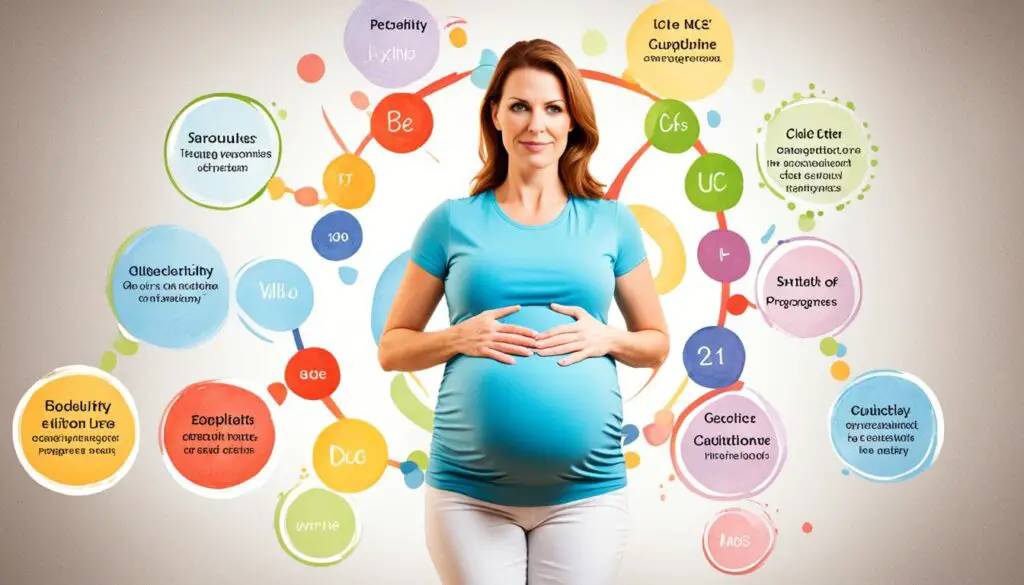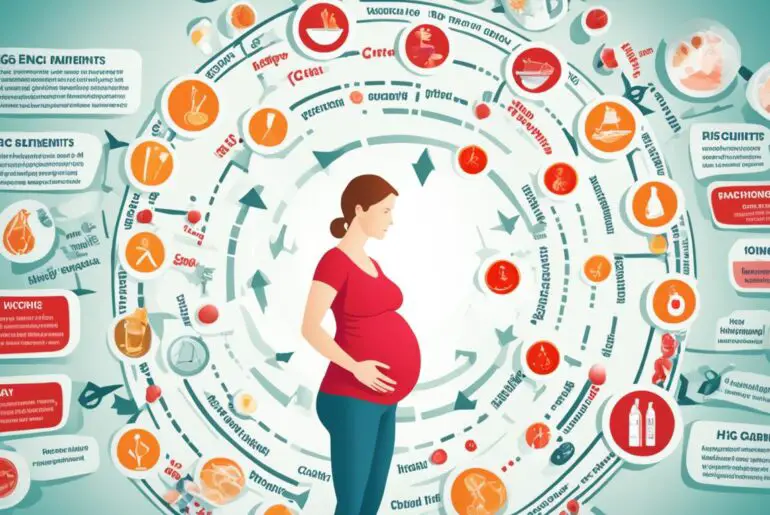Did you know that the HCG diet, a controversial weight loss plan that combines HCG supplements or hormone injections with an extremely low-calorie diet, poses potential risks for pregnant women? While HCG is commonly known as the pregnancy hormone, its use in the HCG diet has raised concerns among health experts.
Key Takeaways:
- The HCG diet is not recommended for pregnant women due to potential risks and lack of evidence for its safety during pregnancy.
- Pregnant women should consult with healthcare providers for personalized guidance on safe and appropriate diet and weight management strategies.
- Focus on maintaining a healthy and balanced diet during pregnancy, prioritizing the well-being of both the mother and the baby.
- The HCG diet restricts calorie intake and involves the use of hormone supplements or injections, both of which can be unsafe during pregnancy.
- Choose safe and effective alternatives to the HCG diet that support the health and growth of both the mother and the baby.
What is the HCG Diet?
The HCG diet is a popular weight loss plan that combines HCG supplements or hormone injections with a low-calorie diet. This short-term eating plan consists of three phases aimed at promoting rapid weight loss. However, its safety and effectiveness are widely disputed.
In the first phase, users consume high-calorie, high-fat foods while taking HCG supplements or receiving hormone injections. This phase is designed to build up the body’s fat stores in preparation for the next phase.
“During the first phase, users take HCG supplements or receive hormone injections while consuming high-calorie, high-fat foods.”
The second phase involves a drastic reduction in calorie intake, typically to 500 or 800 calories per day. This phase is characterized by a low-calorie diet and continued use of HCG supplements or injections. The goal is to trigger the body to burn fat for energy and promote rapid weight loss.
“The second phase involves a drastic reduction in calorie intake, typically to 500 or 800 calories per day, accompanied by continued use of HCG supplements or injections.”
The third phase focuses on gradually increasing caloric intake while discontinuing HCG treatment. This phase is intended to stabilize weight and establish healthy eating habits for long-term weight management.
“The third phase focuses on gradually increasing caloric intake while discontinuing HCG treatment.”
Throughout the diet, users are encouraged to follow a strict list of approved foods and avoid certain food groups. The HCG diet is highly restrictive and requires careful adherence to the prescribed guidelines.
“The HCG diet is highly restrictive and aims to promote rapid weight loss.”
| Phase | Objective | Description |
|---|---|---|
| Phase 1 | Prepare the body | Consume high-calorie, high-fat foods while taking HCG supplements or hormone injections. |
| Phase 2 | Promote rapid weight loss | Drastically reduce calorie intake to 500 or 800 calories per day while continuing HCG treatment. |
| Phase 3 | Stabilize weight and establish healthy habits | Gradually increase caloric intake while discontinuing HCG treatment. |
The HCG diet is intended to produce quick results, but its safety and effectiveness remain controversial. It is important to consult with a healthcare professional before starting any weight loss plan, especially one as restrictive as the HCG diet.
HCG Diet Restrictions and Guidelines During Pregnancy

Pregnant women should not attempt the HCG diet due to the potential risks to both the mother and the developing fetus. The extreme calorie restriction and hormone supplements or injections involved in the diet can put undue stress on the body and may lead to nutritional deficiencies, inadequate weight gain, or complications during pregnancy. It is essential for pregnant women to prioritize a balanced and nutritious diet that supports their health and the growth of their baby.
During pregnancy, the focus should be on consuming a variety of nutrient-rich foods that provide essential vitamins, minerals, and macronutrients. This helps ensure the health and well-being of both the mother and the baby.
Following the HCG diet during pregnancy can potentially deprive the body of important nutrients needed for proper fetal development. The severe calorie restriction may hinder the baby’s growth and development, leading to complications or even fetal abnormalities.
In addition, the hormone supplements or injections used in the HCG diet can have unknown effects on pregnant women and their developing babies. It is important to prioritize caution and seek guidance from healthcare professionals when considering any dietary changes or weight loss plans during pregnancy.
Why the HCG Diet is Not Safe During Pregnancy
The HCG diet involves consuming only 500-800 calories per day, which is significantly lower than the recommended calorie intake for pregnant women. Pregnant women have higher nutritional needs to support the growth of the fetus, and consuming such low calories can lead to inadequate nutrient intake.
Restricting calories to this extent can result in nutrient deficiencies, such as insufficient intake of vitamins, minerals, and essential fatty acids. These nutrients are crucial for the development of the baby’s organs, bones, and nervous system.
Furthermore, hormone supplements or injections used in the HCG diet have not been proven safe for use during pregnancy. The effects of these hormones on fetal development are largely unknown, and there is a potential risk of harm to both the mother and the baby.
It is worth noting that the U.S. Food and Drug Administration (FDA) has not approved HCG drugs for weight loss purposes. The use of HCG supplements or injections for weight loss is not supported by scientific evidence and may carry potential risks.
Recommended Dietary Guidelines for Pregnant Women
Pregnant women should focus on maintaining a balanced and nutritious diet that supports their health and the growth of their baby. Here are some guidelines to consider:
- Consume a variety of fruits and vegetables for essential vitamins, minerals, and fiber.
- Incorporate lean proteins such as poultry, fish, and tofu for adequate protein intake.
- Choose whole grains for a good source of carbohydrates and fiber.
- Incorporate healthy fats from sources like avocados, nuts, and olive oil.
- Avoid excessive intake of sugary foods and drinks.
- Stay hydrated by drinking plenty of water throughout the day.
- Consult with a healthcare provider or registered dietitian for personalized guidance on prenatal nutrition.
Comparison of HCG Diet and Recommended Pregnancy Diet
| HCG Diet | Recommended Pregnancy Diet |
|---|---|
| Extreme calorie restriction (500-800 calories per day) | Meeting the recommended calorie intake for pregnancy (~2,200-2,900 calories per day) |
| HCG hormone supplements or injections | Natural sources of nutrients from whole foods |
| Limited food choices and variety | Diverse range of fruits, vegetables, proteins, whole grains, and healthy fats |
| Risk of nutrient deficiencies | Promotes meeting nutritional needs for pregnant women and the developing fetus |
As shown in the table, the HCG diet and the recommended pregnancy diet differ significantly in terms of calorie intake, nutrient sources, food choices, and their impact on overall health and fetal development.
Recommended Foods on the HCG Diet
The HCG diet is a highly restrictive eating plan that imposes limitations on the types of foods that can be consumed. To ensure optimal results, it is essential to adhere to the approved food list and follow the HCG Diet meal plan. Here are the key food categories allowed on the HCG Diet:
Approved Lean Proteins
Lean proteins are an essential component of the HCG Diet. These options provide satiety and essential nutrients while minimizing calories and fat intake. Approved lean protein choices include:
- Chicken
- Egg whites
- White fish
- Crab
- Lobster
- Scallops
- Extra-lean beef
- Bison
Allowed Vegetables
Vegetables play a crucial role in providing vitamins, minerals, and fiber while contributing minimal calories to the HCG Diet. The following vegetables are allowed:
- Spinach
- Lettuce
- Celery
- Cauliflower
- Broccoli
- Tomatoes
- Onions
Approved Fruits
Fruits can add natural sweetness and essential nutrients to the HCG Diet. The following fruits are permitted:
- Berries
- Citrus fruits
- Apples
Beverages
Approved beverage options on the HCG Diet include:
- Coffee
- Tea
- Water
While these beverages are allowed, it is crucial to minimize the consumption of milk and use specific approved sweeteners in limited quantities.
The HCG Diet food restrictions prohibit the consumption of dairy products, carbohydrates, fats and oils, sugary foods and desserts, and high-calorie beverages. Adhering to these restrictions is essential to achieve the desired results on the HCG Diet.
Potential Risks and Side Effects of the HCG Diet

The HCG diet is highly controversial and has been criticized for its extreme calorie restriction and unproven claims of effectiveness. While some proponents of the diet argue that it leads to rapid weight loss, it is important to consider the potential risks and side effects associated with this approach.
One of the main concerns with the HCG diet is the potential for nutrient deficiencies. With such a severe reduction in calorie intake, the body may not receive enough essential vitamins, minerals, and macronutrients. This can lead to fatigue, dizziness, weakness, and a compromised immune system.
Muscle loss is another common side effect of the HCG diet. The low-calorie intake combined with the hormone supplements or injections can cause the body to break down muscle tissue for energy. This can result in a decrease in muscle mass, which is crucial for maintaining a healthy metabolism and overall strength.
“The HCG diet poses risks including nutrient deficiencies, muscle loss, fatigue, and hormonal imbalances.”
Other potential side effects of the HCG diet include fatigue, headaches, hormonal imbalances, and disordered eating patterns. The extreme calorie restriction and reliance on hormone supplements can disrupt the body’s natural hormonal balance, leading to mood swings, irregular menstrual cycles, and other hormonal issues.
It is also important to note that the use of HCG hormone supplements or injections for weight loss purposes is not approved by the FDA. This means that the long-term health consequences of using HCG in this manner are largely unknown.
Overview of Potential Risks and Side Effects
| Potential Risks and Side Effects | Description |
|---|---|
| Nutrient Deficiencies | The severe calorie restriction may lead to inadequate intake of essential vitamins, minerals, and macronutrients, resulting in fatigue, dizziness, weakness, and a compromised immune system. |
| Muscle Loss | The low-calorie intake paired with hormone supplements or injections can cause the body to break down muscle tissue for energy, leading to a decrease in muscle mass and potential weakness. |
| Fatigue and Headaches | The extreme calorie restriction may result in a lack of energy and frequent headaches due to the body’s insufficient fuel source. |
| Hormonal Imbalances | The HCG diet can disrupt the body’s natural hormonal balance, possibly leading to mood swings, irregular menstrual cycles, and other hormonal issues. |
| Disordered Eating Patterns | The strict dietary restrictions of the HCG diet can contribute to an unhealthy relationship with food and the potential development of disordered eating habits. |
| FDA Approval | The use of HCG hormone supplements or injections for weight loss purposes is not approved by the FDA, and the long-term health consequences are largely unknown. |
Given the potential risks and the lack of compelling evidence supporting the efficacy of the HCG diet, it is important to approach this weight loss approach with caution. Consulting a healthcare provider or registered dietitian is highly recommended before embarking on any diet plan, especially one as controversial as the HCG diet.
Alternatives to the HCG Diet for Pregnant Users
Pregnant women should prioritize their health and the well-being of their baby by maintaining a safe and healthy diet throughout their pregnancy. It is important to focus on consuming nutrient-rich foods that provide essential vitamins and minerals for both mother and baby. Here are some safe diet options and tips for managing weight during pregnancy:
Eat a Variety of Nutrient-Rich Foods
During pregnancy, it is crucial to consume a balanced mix of fruits, vegetables, lean proteins, whole grains, and healthy fats. These foods provide essential nutrients like folic acid, iron, calcium, and omega-3 fatty acids, which are crucial for healthy fetal development. Including a variety of foods in your diet ensures you get a wide range of essential nutrients.
Consult with a Healthcare Provider or Registered Dietitian
Every pregnancy is unique, and consulting with a healthcare provider or registered dietitian can provide personalized guidance on managing weight during pregnancy. They can offer advice on proper calorie intake, portion sizes, and recommend foods that meet the specific nutritional needs of both the mother and the baby.
Stay Active and Engage in Regular Exercise
Regular physical activity is beneficial during pregnancy, as long as it is safe and approved by your healthcare provider. Engaging in activities like prenatal yoga, swimming, or low-impact exercises can help manage weight gain, improve overall fitness, and reduce the risk of pregnancy complications.
“Maintaining a healthy and balanced diet during pregnancy is crucial for both the mother’s well-being and the baby’s development. Consulting with a healthcare provider and following their recommendations can ensure a safe and healthy pregnancy journey.”
Remember, pregnancy is not the time for strict weight loss diets or fad diets like the HCG diet. It is important to prioritize the health of both the mother and the baby, and focus on adopting healthy eating habits that support optimal nutrition and weight management during this special time.
| Safe Diet Options for Pregnant Women | Pregnancy Weight Management Tips |
|---|---|
| Eat a variety of nutrient-rich foods Consult with a healthcare provider or registered dietitian Stay active and engage in regular exercise |
Avoid excessive weight gain, aim for healthy weight gain Monitor portion sizes and avoid overeating Follow a regular eating schedule and incorporate healthy snacks |
The Importance of Consulting a Healthcare Provider

When it comes to weight loss during pregnancy or seeking guidance on your pregnancy diet, consulting a healthcare provider is of utmost importance. As an expectant mother, your health and the well-being of your baby should always be the top priority. By seeking professional advice, you can ensure that you are following safe and appropriate practices for both your weight management and overall pregnancy nutrition.
Your healthcare provider plays a crucial role in assessing your individual health needs. They can consider any underlying medical conditions you may have and provide personalized guidance tailored to your specific situation. Their expertise and knowledge allow them to recommend suitable diet and weight management strategies that promote a healthy and balanced approach for you and your baby.
“As an expectant mother, your health and the well-being of your baby should always be the top priority.”
By consulting a healthcare provider, you can address any concerns or questions you may have about weight loss during pregnancy. They can help you set realistic goals and ensure that you are taking appropriate steps to achieve them safely. They can also guide you in making informed choices regarding your pregnancy diet, assisting you in selecting the right food groups and portion sizes to support both your nutritional needs and the healthy development of your baby.
Furthermore, a healthcare provider can monitor your progress and make any necessary adjustments to your weight management plan as your pregnancy progresses. This ongoing support and guidance are crucial in ensuring that your weight loss efforts align with the best interests of both you and your baby.
Benefits of Consulting a Healthcare Provider for Weight Loss During Pregnancy
Below are some key benefits of consulting a healthcare provider when it comes to weight loss during pregnancy:
- Accurate assessment of your health needs and considerations
- Personalized guidance and recommendations
- Safe and appropriate diet and weight management strategies
- Addressing concerns and answering questions
- Setting realistic goals for weight loss during pregnancy
- Monitoring progress and making necessary adjustments
- Supporting a healthy and balanced approach
Remember, every pregnancy is unique, and what works for someone else may not be suitable for you. Seeking professional advice ensures that your weight loss journey is tailored to your specific needs and circumstances.
Consulting a Healthcare Provider: Your Key to a Healthy and Balanced Approach
When it comes to weight loss during pregnancy and following a pregnancy diet, consulting a healthcare provider is non-negotiable. Their expertise in prenatal care and nutrition allows them to guide you in making choices that prioritize your health and the development of your baby. With their support and recommendations, you can embark on a weight loss journey that is safe, effective, and aligns with the unique needs of your pregnancy.
Conclusion
The HCG diet is not recommended for pregnant women due to the potential risks and lack of evidence for its safety during pregnancy. The extreme calorie restriction and use of hormone supplements or injections involved in the HCG diet can put undue stress on the body and may lead to nutritional deficiencies, inadequate weight gain, or complications during pregnancy. It is crucial for pregnant women to prioritize a healthy and balanced diet that supports their health and the growth of their baby.
Consulting with healthcare providers is essential for personalized guidance during pregnancy. They can provide safe and effective alternatives to the HCG diet and tailor nutritional advice to meet individual needs. By working with healthcare professionals and focusing on maintaining a healthy lifestyle, pregnant women can ensure the well-being of both themselves and their baby.
In conclusion, the HCG diet should be avoided during pregnancy. Its restrictions on calorie intake and reliance on hormone supplements or injections are not suitable for expectant mothers. Prioritizing a balanced diet, consulting with healthcare providers, and following their guidance are key to ensuring a healthy and safe pregnancy.
FAQ
Are pregnant women allowed to do the HCG diet?
No, the HCG diet is not recommended for pregnant women due to potential risks and lack of evidence for its safety during pregnancy.
Why is the HCG diet not safe during pregnancy?
The HCG diet involves extreme calorie restriction and the use of hormone supplements or injections, both of which can be unsafe and pose risks to the health of both the mother and the developing fetus.
What are the recommended foods on the HCG diet?
Approved foods on the HCG diet include lean proteins like chicken, egg whites, and white fish, certain vegetables like spinach and lettuce, and approved fruits like berries and citrus fruits.
What are the potential risks and side effects of the HCG diet?
Potential risks and side effects of the HCG diet include nutrient deficiencies, muscle loss, fatigue, dizziness, headaches, hormonal imbalances, and the development of disordered eating patterns.
Are there alternatives to the HCG diet for pregnant women?
Yes, there are safe and healthy alternatives to the HCG diet for pregnant women. Consult with a healthcare provider for personalized guidance on weight management and a balanced diet during pregnancy.
Why is it important to consult a healthcare provider before starting the HCG diet?
Consulting a healthcare provider is important to assess individual health needs, consider underlying medical conditions, and receive personalized guidance on safe and appropriate diet and weight management strategies.
Can HCG supplements or injections be used for weight loss during pregnancy?
No, the use of HCG hormone supplements or injections for weight loss during pregnancy is not approved by the FDA and may have unknown health consequences.
What should pregnant women prioritize for a healthy and balanced diet?
Pregnant women should prioritize consuming a variety of nutrient-rich foods, including fruits, vegetables, lean proteins, whole grains, and healthy fats, to support their health and the growth of their baby.




